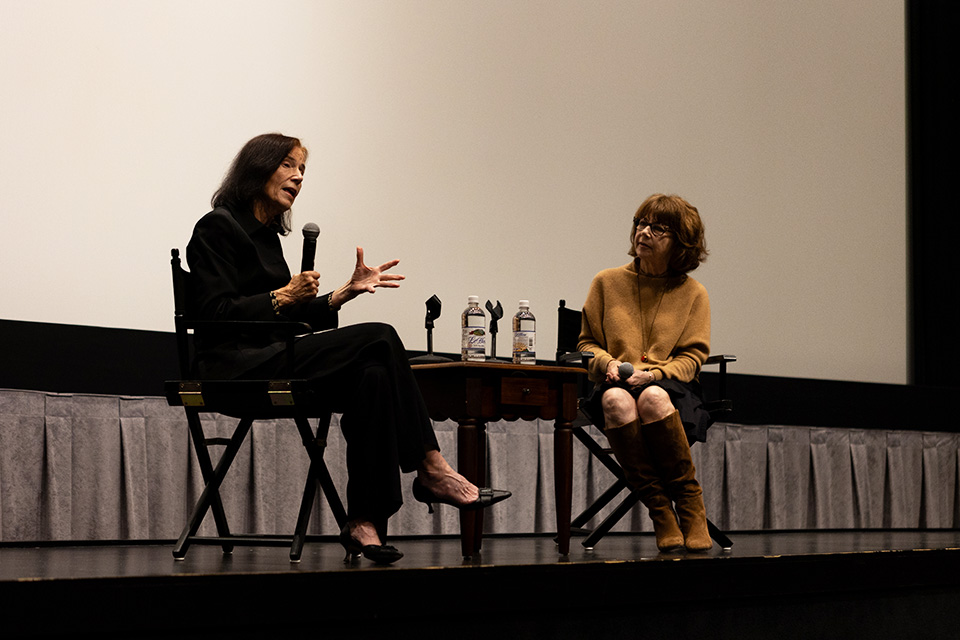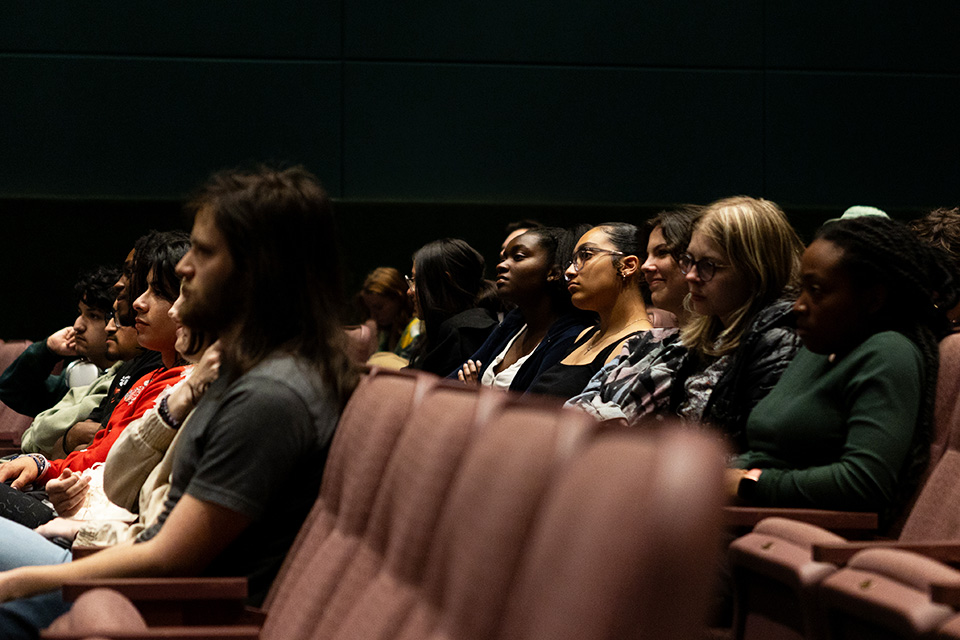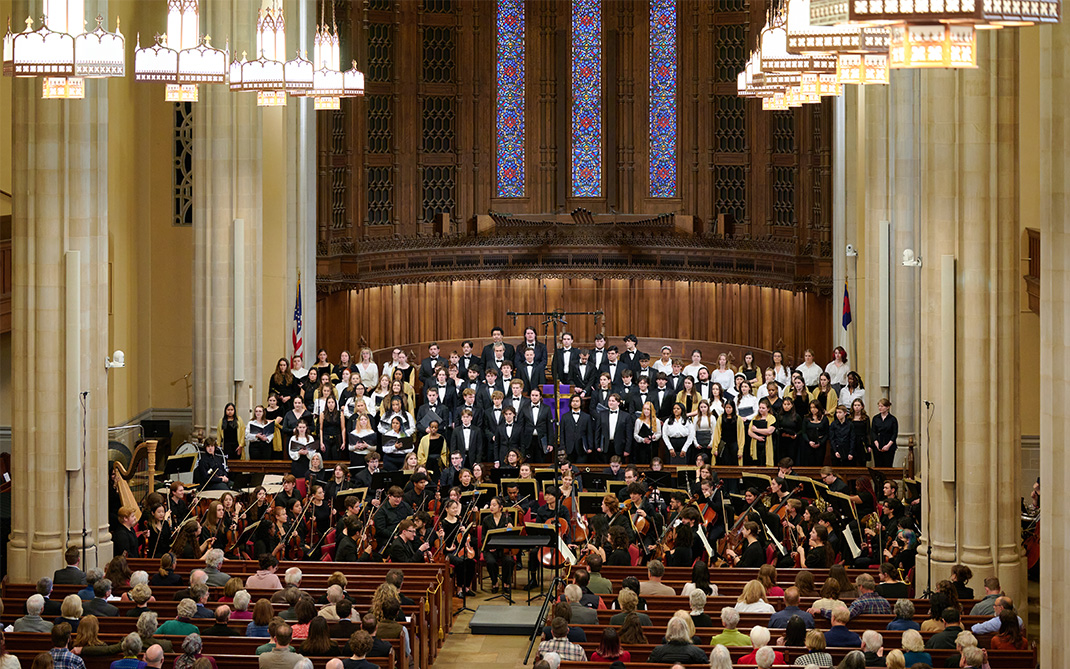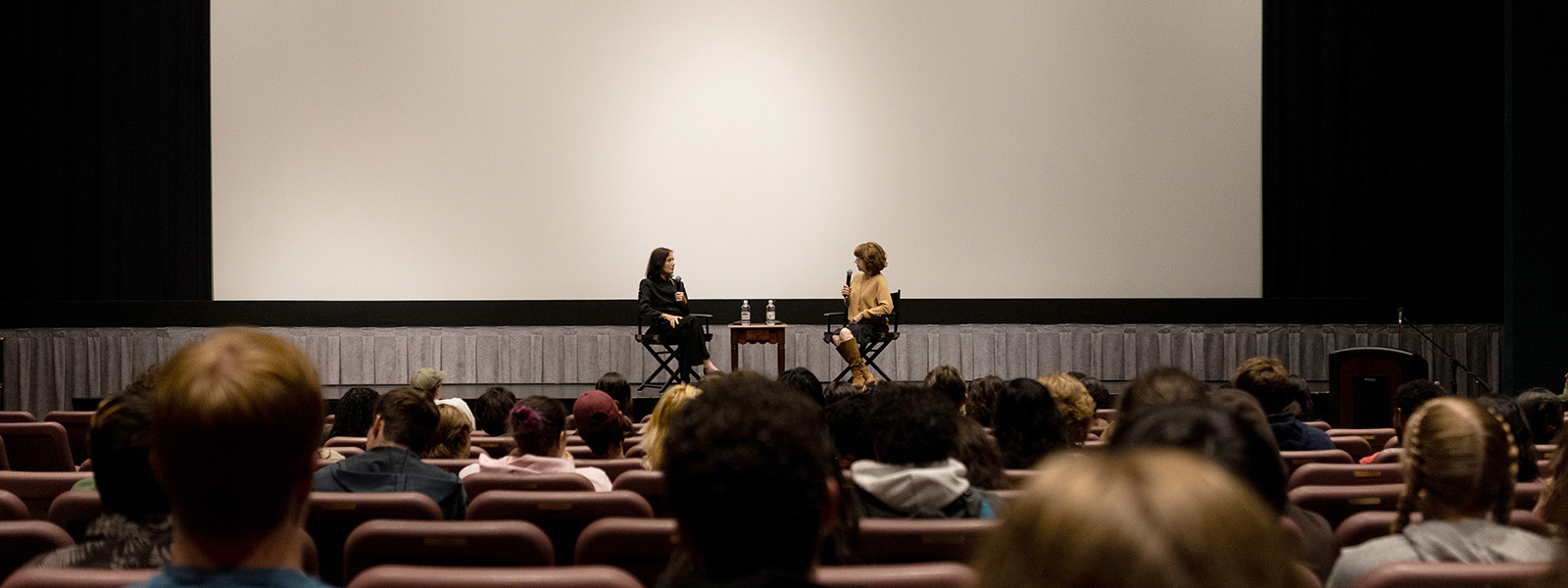Disney legend Linda Woolverton shares insights and inspiration at UNCSA
For generations, iconic films like “Beauty and the Beast,” “The Lion King” and “Maleficent” have enchanted audiences, inspiring countless individuals to explore the world of filmmaking and pursue careers in the arts. The creative force behind these beloved films and many more is Linda Woolverton, a visionary talent and screenwriter.
In April 2024, Woolverton visited UNCSA to share her expertise with the next generation of filmmakers. During her visit, she engaged directly with students from the School of Filmmaking, providing invaluable insights and inspiration. Her visit culminated in a special screening of her 1991 film “Beauty and the Beast,” followed by an onstage conversation with Dean of Filmmaking Deborah LaVine and a lively Q&A session with the audience that included students from across campus.
UNCSA has a strong tradition of bringing distinguished artists to campus, with recent guests including Julie Taymor and Nick Hornby. These opportunities are typically made possible through the robust industry connections of the faculty and staff. Woolverton's connection to UNCSA, however, is uniquely profound, as she was an undergraduate classmate of Dean LaVine at California State University, Long Beach.
Beauty and the Beast
In the words of LaVine, Woolverton is “pure creativity, a spitfire, and has stood up to the Goliath beast of an industry throughout her career.” This can be seen through her many achievements and accolades but is perhaps best exemplified in her work on the iconic film “Beauty and the Beast,” a cornerstone of the Disney Renaissance era.
In the late 1980s, Woolverton was hired by Walt Disney Feature Animation to be a screenwriter for the film, a move that was groundbreaking for two main reasons. One, it was the first Disney feature animated film to utilize a screenwriter (historically the studio used the storyboarding process initially and then based a script off of the storyboard). Two, Woolverton was the first woman to be a screenwriter for a Disney animated feature. During production, Woolverton also collaborated with two notable filmmakers and artists: composer Alan Menken and lyricist Howard Ashman.

Guest artist Linda Woolverton in coversation with Dean Deborah LaVine. / Photo: Shelby Lail
Disney’s faith in Woolverton was not misplaced as “Beauty and the Beast” went on to become the first animated film nominated for an Academy Award for Best Picture. This distinction is shared with only two other animated films, “Up” and “Toy Story 3,” both from Disney/Pixar. Additionally, the nineties classic has been entered into the U.S. National Film Registry in the Library of Congress for being “culturally, historically or aesthetically significant.”
During the Q&A portion of the evening, many questions focused on where Woolverton drew inspiration from and her process for writing the iconic film. Students asked about the finer points of the film, such as the rose and the intertwining character arcs of the Beast and Gaston.
Woolverton also revealed that it was at her and her collaborator Howard Ashman’s insistence that Belle’s character was an avid reader and an intellect. “It had never been done in a Disney feature film before,” explained Woolverton. “Women were sweet and talked to animals and sang but they weren’t really smart, and we wanted to make her that.” After receiving pushback from the Studio that reading is too static of an activity for animation, Woolverton drew inspiration from her own childhood habit of reading while walking around town to develop the opening scene of the film, which was then accepted.
A storied career
“At the Beauty and the Beast screening, Linda delighted students and audience members from the community by sharing behind-the-scenes anecdotes and stories from her most revered films,” says Dean LaVine. “Pulling the curtain back offered teaching moments that demonstrated how inspiration exists all around us.”
During the Q&A session, Woolverton also discussed various other projects from her career, highlighting how many draw inspiration from existing works.
“When Disney came to me with the idea for ‘The Lion King,’ they knew they wanted a coming of age film with a lion cub in Africa but didn’t quite have the story figured out,” explains Woolverton. “When I was brought in, I asked why they wanted to make this film and I was told a story by one of the filmmakers – the inspiration came from a trying time when he was betrayed by an uncle figure and had to testify in court. I was sent home to analyze the story elements under the lens of the hero’s journey and realized that many of the themes fit into the story of Shakespeare’s ‘Hamlet’ so I went forward with that idea.”
Another notable film she discussed was the 2010 live-action adaptation “Alice in Wonderland,” directed by Tim Burton. Woolverton made history with this project, becoming the first female screenwriter to receive sole credit on a film that grossed over $1 billion. Moreover, this film is often credited with igniting the trend of live-action remakes of classic animated movies. “I had to think of a way to make the story fresh,” recalls Woolverton. “I realized that having her go back as an adult would make for a compelling story.”
Woolverton explained that the 2014 live-action film “Maleficent” also posed a challenge for her — she initially turned down the project. “I then went and watched the original animated film and realized that Maleficent was a fairy but was asking myself what happened to her wings,” she says. “That thought process led to me developing a motivation for the character since something integral to her and her identity was taken away. It then opened up the whole story.”
On screen and stage
Having studied Theater Arts in her undergraduate education and Theater for Children in her graduate education, live theater has also been a significant facet of Woolverton’s career. She has developed the book for three major Broadway musicals including “Beauty and the Beast,” “Aida” and “Lestat.”
After the release of the 1991 film “Beauty and the Beast,” Disney saw immediate commercial success as it became the highest-grossing animated film ever and was widely lauded for the award-winning music and lyrics. Inspired by the Broadway success of other contemporary works such as “Cats” and “Phantom of the Opera,” Disney decided to adapt “Beauty and the Beast” to become the studio’s first Broadway venture.
Woolverton was enlisted as the playwright for the production, charged with transforming the 84-minute animated film into a full-length, two-act Broadway musical — an initially daunting task that prompted her to say, “Yikes.” Nevertheless, the adaptation proved successful, earning her a Tony Award nomination for Best Book of a Musical. Another nomination that the production received was School of Drama alumnus Terrence Mann (B.F.A. ‘78) for Best Performance by a Leading Actor in a Musical.
Although the initial writing was completed for the production’s 1994 debut, Woolverton has continued to be involved in every remount since. “Every time it gets redone, be it in the West End, Australia or for a tour, I get to look at it and tinker with the script,” says Woolverton. “I don’t want the show to feel stuck in the feminism of the 90s, my goal is for it to feel more fluid.”
Inspiring the next generation
During her visit, Woolverton spent one day with students in the Animation concentration and one day with students in the Screenwriting concentration to hear from and guide the future filmmakers. “I got to hear pitches for films and give feedback directly to the students,” explains Woolverton. “I thoroughly enjoyed getting to learn from the next generation of filmmakers.
“Linda Woolverton's guest artist visit inspired our students with her warmth, openness and genuine appreciation for their magical ideas,” says Dean LaVine. “Beyond being a historical figure who blazed pathways for women in the entertainment industry, Linda has, and continues to be a model for artistic self-respect. She encouraged them to never stop believing in their artistic intuition.”

Students listening to Woolverton and LaVine discuss the film industry and Woolverton's extensive career. / Photo Shelby Lail
Throughout her visit, Woolverton was happy to give advice and inspiration to students. “You can’t be worried about whether you are liked. Know that you are there to work and you have a story to share,” says Woolverton. “You just have to believe and focus on the art, not your ego. It’s about having something to say that's worthwhile and worthy. We need your voices in the industry.”
July 08, 2024




